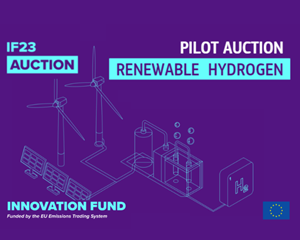News
European Hydrogen Bank pilot auction: 132 bids received from 17 European countries
The pilot auction under the European Hydrogen Bank, for renewable H2 production in Europe, has attracted 132 bids from projects located in 17 European countries. The total support requested far exceeds the currently available budget of €800 MM, provided by the Innovation Fund.
Kurt Vandenberghe, Director-General for Climate Action said, “The applications are in and the enthusiastic market response to the pilot auction shows the European H2 industry is ready to scale up! Renewable H2 is an important solution in Europe’s endeavor to reach climate neutrality by 2050. The success of this pilot auction is the result of thorough engagement and consultation with relevant stakeholders and a solid regulatory framework which provides certainty to investors. We now have a scheme that provides efficient and targeted public support in full alignment with market needs.”
All bids taken together provide for a total planned electrolyzer capacity of 8.5 gigawatts (GW). Over the span of ten years, this would lead to a total production volume of 8.8 MMt of renewable H2. On a yearly basis, this would cover close to 10% of the EU’s REPowerEU ambition for domestic renewable H2 production in 2030.
Producers of renewable H2, as defined in the Renewable Energy Directive and its Delegated Acts, have made their bids to receive support in the form of a fixed premium per kilogram of renewable H2 produced. This premium bridges the gap between the cost of production and the price buyers are currently willing to pay for renewable H2 rather than fossil H2. The Commission is also offering a new “Auctions-as-a-service” mechanism to enable Member States to benefit from the EU-level platform and award national funding to additional projects, in full respect of State aid rules. Germany is the first EU country to make use of the “Auctions-as-a-service” feature, putting up €350 MM from its national budget for renewable H2 production projects located in Germany in case eligible bids for German projects cannot receive Innovation Fund support due to budget limitations.
The European Executive Agency for Climate, Infrastructure and Environment (CINEA) is currently checking the admissibility and eligibility of the bids and will then evaluate them. The bids will be ranked according to their price. Applicants will be informed about the evaluation results in April/May 2024 and successful applicants will be invited to prepare and sign the grant agreements.
The grant agreements will be signed by November 2024 at the latest. The selected projects will have to start producing renewable H2 within five years of signing the grant agreement. They will receive the awarded fixed premium subsidy for up to 10 years and only upon certified and verified renewable H2 production.
In parallel to finalizing the evaluation, the commission will draw the lessons learned from this pilot and consult industry stakeholders on the draft Terms & Conditions for the second round of the H2 auction, which it aims to launch before the end of the year.


